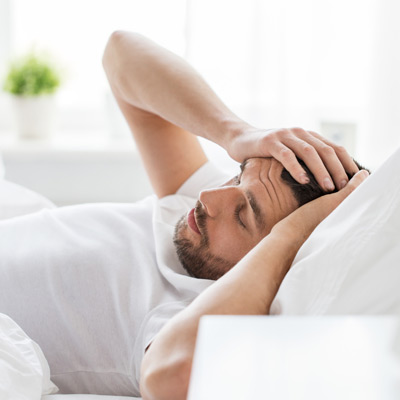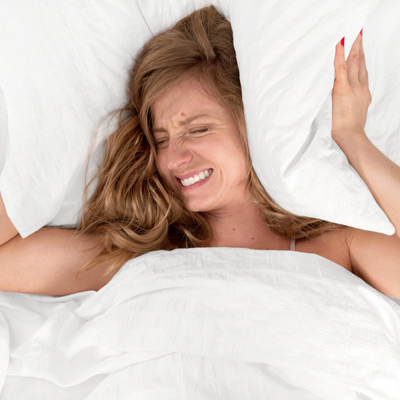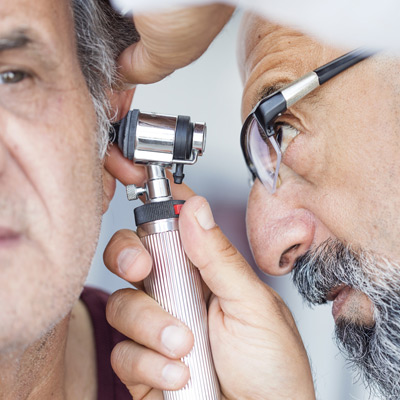How to Relieve Earache Pain Fast and Get More Sleep
08-06-2016

When you are all wrapped up in your warmest clothing and the cold weather doesn’t seem to trouble you, stepping out into the cool air on a winter morning can be both fun and refreshing. However, on those unfortunate occasions when you happen to leave your hat behind, and the chilly wind blows past your ears, the resulting pain can be agonising. You will often wonder whether you’re suffering from an earache or if the harsh weather is the cause of your misery.
Even worse, while being outdoors appears to cause the pain in your ear to fluctuate, trying to settle down in the evening also intensifies the ache, denying you much needed sleep.
So how can you relieve the symptoms of earache and get more sleep? This article will show you how.
But First, What is Earache?
Earache is pain in the inner or outer ear that can interfere with your ability to hear. It can be extremely bothersome and can cause debilitating pain, affecting your ability to sleep and overall well being.
 What Are the Causes of Earache?
What Are the Causes of Earache?
Though mostly common in children, earaches also affect people of all ages and normally feel like a dull, sharp, or burning pain. The ache can either be constant, or it may come and go over a short period of time or even last for months. This condition may affect just one of your ears or both.
There are several reasons why earaches occur in people. Some of the causes of earaches include:
• Ear Infections: When the earache is as a result of an ear infection, a pus-like or watery fluid may come out of the affected ear. The most common ear infections are: Otitis externa (outer ear infection) and Otitis media (middle ear infection). Otitis externa causes inflammation of the tube located between the eardrum and outer ear (the external ear canal), and the resulting pain can be very severe or moderate. On the other hand, Otitis media causes a build-up of fluid as well as inflammation behind the eardrum.
• Damage to the ear: Earache can also occur due to injury to the inside of the ear caused by either scratching or poking. This is because, despite doctors’ warnings, many people are fond of poking cotton buds inside their ears and even scraping earwax from their ear canals - all of which can easily damage your ear canal. Normally, such actions scrape the ear canal, push the wax back into your ear, and can also puncture your eardrum if the cotton bud is poked too far into the ear, causing unbearable pain.
• Earwax buildup: Some people naturally produce more earwax than others, and this can cause a blockage to form inside their ear canals, which can be painful and may even interfere with their hearing. It can also create an ‘earwax plug’- a condition where the earwax buildup hardens and blocks your ear’s passageway.
• Throat Infections: Earaches are also symptoms of throat infections such as quinsy or tonsillitis. Therefore, if you are suffering from a sore throat and finding it painful to swallow as well, your ear pain could be as a result of such infections.
• Glue ear: This is a condition whereby fluid builds up in the middle ear and the pressure exerted by this fluid causes an earache. Glue ear is quite common in children and can at times cause temporary hearing loss.
• A dental abscess: Earache is occasionally the result of a dental abscess which is brought about by a bacterial infection. This health problem causes a collection of pus, which can form in your gums or teeth giving rise to a throbbing and intense ache in the affected tooth; and the pain sometimes spreads to the ear.
• Problems with your jaw: In some cases, ear pain is also caused by a problem affecting the joint of the jaw bone. This is a condition that’s referred to as temporomandibular joint pain and can be the result of other problems such as teeth grinding or arthritis.
 Why does ear pain feel worse at night?
Why does ear pain feel worse at night?
In the daytime the head is almost always in a vertical position and as such air is able to flow freely through the Eustachian tubes (a narrow passage running from the throat to the middle ear cavity). Furthermore, actions such as yawning and chewing (which are more common during the day) cause these tubes to open wider and this helps to drain fluid from them, thereby allowing more air to pass through. However, when you’re lying down at night, this makes it increasingly difficult for the air to pass through; and the tubes cannot drain and may become blocked. This can therefore explain why your ear pain may feel worse during nighttime compared to the ache felt during the day.
Settling down into your normal sleep routine becomes a difficult task when suffering from an earache, since it’s hard for you to lie down on the particular side where the pain is emanating from. In addition, you may find yourself waking up frequently during the night owing to sudden sharp pains in the ear; and this in turn, may leave you feeling worn out and quite unsettled during the next day.
What are the treatments of earache to improve your sleep quality?
More often than not earaches tend to go away on their own; and if your pain is the result of an ear infection, then a prescribed course of antibiotics or ear drops should be able to help you feel better within 2 to 3 days.
But here are some other ways of managing your earache:
Relieve earache at home with these home remedies - During the first 48 hours of the earache, there are several home remedies that you can try, which may help to alleviate the ear pain and hence allow you to have a more peaceful night’s sleep. These may include the following:
• At night try elevating your head using a few extra soft pillows; this can help to clear your Eustachian tube and allow more air to pass through. It is however, worth noting that sleeping like this may cause spinal and neck pain. Therefore, if possible you should elevate your bed’s head instead, by placing 5 or 6 inch wooden blocks under the bed’s legs or use a few sturdy books. You can also put a wedge pillow between the bed and your mattress (wedge pillows are available in many pharmacies and medical supply stores).
• Try placing a heat pack or a warm flannel cloth over the area where the pain is coming from for about five minutes; if your problem is as a result of blockage caused by earwax buildup, the heat radiating from the cloth should help to soften the earwax.
• Another heat remedy you can try involves putting a hairdryer on a low, warm setting and holding it about twenty centimeters away from your affected ear. You should then maintain this position for a few minutes.
• If the ear pain happens to wake you from your sleep at night, you can try swallowing and yawning as this will also help to open up the Eustachian tubes.
• You can also take pain relievers such as ibuprofen, acetaminophen or paracetamol, before going to bed. This will help to relieve your ear pain during the night and even throughout the day as you await your doctor’s appointment.
• Sip some water before going to sleep; the swallowing motion can help to trigger the muscles that enable the Eustachian tubes to open up and drain, therefore reducing your ear pain.
• Another popular home remedy that some people swear by involves: placing a drop of lobelia or mullein oil, or a few drops of warmed garlic or olive oil in their ears, then loosely plugging them with cotton balls.
 Consult your doctor if the ear pain persists for more than 48 hours. Do not poke at the affected ear or even attempt to medicate yourself (other than taking pain relievers), until you’ve seen your health care provider. Otherwise, this could very well worsen your earache leading to an infection. The doctor may prescribe some medication for your condition or if your ears are blocked, he or she may offer to syringe them during a later appointment.
Consult your doctor if the ear pain persists for more than 48 hours. Do not poke at the affected ear or even attempt to medicate yourself (other than taking pain relievers), until you’ve seen your health care provider. Otherwise, this could very well worsen your earache leading to an infection. The doctor may prescribe some medication for your condition or if your ears are blocked, he or she may offer to syringe them during a later appointment.
Mild earache is one of those health conditions that can feel worse at night when you are lying awake in bed, since at this point you have all the time to think about it, despite the ache not being the actual cause of your lack of sleep. With this in mind, one way of keeping yourself from ‘over-thinking’ a mild earache is to focus on good sleep hygiene - making sure that you get off to sleep more easily and quickly, and of course allowing your body to go about its nighttime rejuvenation process.
Help relieve your earache by improving your sleep system
Another way to help relieve your earache is to improve your sleep system. Having a supportive mattress and pillow is one of the best ways to do this. At Ergoflex, naturally we recommend a memory foam mattress as it is designed to mould and shape to the body’s contours to provide a comfortable and supportive night’s sleep. This will keep your head, neck and back supported.
To further help keep your head and neck elevated and supported all night long, our memory foam pillow is ideal. It is made from true density visco-elastic memory foam that is rated excellent for posture support and it’s elevation can help clear your Eustachian tube to relieve earache.
Further Reading
If you enjoyed this article you will find the below of interest:
Introducing the all-new Ergoflex 5G Memory Foam Mattress
The ultimate sleep improvement checklist
Four theories as to why we need to sleep
More stories like this one



